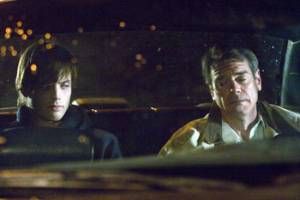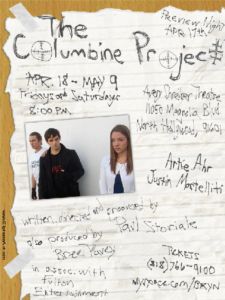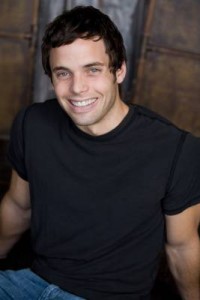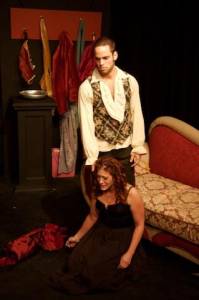Justin Mortelliti is rapidly making a name for himself in the L.A. theater scene, in addition to his work in film and as a recording artist. His performance as Bill Sykes in the West Coast Premiere of Twist earned Justin a Valley Theatre League A.D.A. Award nomination as Best Supporting Actor and a StageSceneLA mention for Outstanding Achievement By A Featured Actor In A Musical. These days, Justin is once again being directed by Twist’s Paul Storiale in the world premiere of Storiale’s The Columbine Project, playing real life teen killer Dylan Klebold. Despite a heavy rehearsal schedule prior to the show’s April 18th opening at North Hollywood’s Avery Schreiber Theatre, Justin still managed to find time to sit down and answer our many questions. Here’s our interview with one of the hottest young actors in Hollywood.
Justin, you’re a New Jersey native who studied at Rutgers University, then spent time in England at the London Academy of Theater. What prompted you to cross the Atlantic?
The BFA program I went through at Rutgers was a conservatory called the Mason Gross School of the Arts which allowed us to study in London and attend The London Academy of Theater.
Fantastic! How long were you there?
It was a full semester of studies and it was amazing. It was definitely the most inspiring and exciting time of my life.
Can you tell us something about your time in England?
At 21, having the chance to see and study the classics and train with some of the best teachers and actors in London was just wild. I really grew up and had a better understanding of myself … and myself as an actor. We landed in London the day before 9/11, which in turn made my stay such a life experience as well. Being so far from home, from my friends and family in New Jersey and New York, for the first time, especially with everything that was going on was … well, it was a lot. Every American was changed that day and to be outside of our home, not knowing what was happening and able to throw ourselves into our art, our theater, it was just an indescribable experience, one that I shared with my fellow actors and friends.
You moved to Los Angeles in 2006. What made you choose the West Coast as a career base as opposed to remaining back East?
Well, since I was a kid I always wanted to move to California. I don’t really know why it was such a mission but it just always was. Having most of my family in New Jersey and Philadelphia, it always seemed a great stretch and a distant dream but I knew I’d go. As far as working in this industry, New York and Los Angeles are both great places to be. After I graduated from Rutgers I moved to New York City for three and a half years. I did my share of theater and independent film as well as my share of pounding the pavement, bartending all night long, getting my feet wet in the industry, freezing in the subways and living in a bedroom the size of a closet … the usual. Moving to Hollywood was just something that I knew would eventually happen and one day I booked a one-way ticket and left. It was time and I felt ready.
One of your first projects here was being part of the West Coast premiere of the musical Twist. What was it like playing Bill Sykes in this very “different” version of the Oliver Twist story?
Playing Bill Sykes was fun!! Getting to be bad-ass and rough people up, being the scary guy in such a campy show was great, I loved it. I had been in the musical Oliver! twice in my life. When I was 13 I played Oliver and when I was 15 I played The Artful Dodger. I don’t think I could do that show again but to switch it up and play Sykes in a version of the tale that included a transgender Fagin?? I couldn’t pass that up. It was a lot of fun.
You’ve also been directed by Garry Marshall in the Falcon Theatre production of Happy Days. How did it feel to be working with someone whose TV career goes back to the 1950s?
It was really a great time. I was thrown in as a replacement just 2 weeks before the show opened so it was a whirlwind experience. I had only been in L.A. for 6 months at that point and suddenly I was onstage with Garry Marshall directing me and Joey McIntyre performing next to me … well, it was surreal. Garry is so funny and so smart and I definitely learned a lot working on that show. Not to mention all of the laughing we did. It took a minute to calm my nerves and settle into the reality of the situation, but I dove into the work as quickly as possible and allowed myself to realize that I deserved to be there. My parents were really pretty excited about my working with Garry as well.

With Beau Hirshfield (Mark) and Mekia Cox (Mimi) in Rent
Most recently, you played Roger in the West Coast regional premiere of Rent. Had being in Rent been a dream of yours?
Roger was definitely a dream role for me. I was in high school when the show debuted on Broadway and everyone was in love with it. It was gritty, taboo and rock ‘n’ roll. I remember singing all of Roger’s songs and hoping that one day I’d be able to play the role and take part in such a wonderful and meaningful story. So finally doing it was amazing. It was one of the most fulfilling theatrical experiences I’d ever had, maybe because the music brought such nostalgia for me, and maybe because of the weight of the role and story. Whatever the reason, I was walking on a cloud the whole time.
How did director Andy Ferrara’s vision compare with the Broadway original?
Andy’s vision was definitely well thought out. He stuck with a lot of the original costumes, sets and ideas to honor the show and the fans. But he put his own twist on a lot of it, making small changes and adjustments here and there. I think he really did a great job of shaping the show into something a little bit different but still the same great Rent.


With Mark Arnold in Negotiations
You’ve also been doing film work, including a starring role in the indie short film Negotiations, for which you received a Best Actor nomination at the Method Film Festival. Can you tell us something about the film and your role in it?
Negotiations was a great father and son story. Mark Arnold played my father and to be able to work off such a seasoned actor was really wonderful. I had the chance to play a gun-carrying junkie slash teen runaway … pretty dramatic. I end up getting caught in a standoff hostage situation where my father was the hostage negotiator. It was exciting, we shot mostly nights and spent a lot of time screaming, crying and shaking guns around … what an experience! Working in film is definitely different than working in the theater, but just as fulfilling. There’s nothing like having a real SWAT team charging at you with guns and actual police sirens in your face in the cold night to get your heart racing.
Were you able to attend various festival screenings?
The film actually went to a number of festivals and I was able to attend some of them here in California.
What was this experience like for you?
It was such an exciting and also strange thing to see people experience it and be affected by it. Most of the time I wasn’t recognized after the film was shown because I don’t look as strung-out and crazy in person as playing that character made me look. It screened in New York as well so my parents back in Jersey had a change to go into the city and see it, which was really great.


Justin prepares for The Columbine Project
Now you’re getting ready to appear as real life Dylan Klebold, the 18-year-old who along with classmate Eric Harris killed 13 people and injured 24 others in the 1999 Columbine High School shootings. What’s it like for you playing this real-life teen killer?
Rehearsals have gotten underway and it has been pretty intense. Playing Dylan Klebold has really given me a chance to dig into the character of someone who lived and died so tragically. I’ve never played a role like this before and I’d be lying if I said it wasn’t scary as hell.
The title, The Columbine Project, is reminiscent of The Laramie Project.
The names are similar but this play itself has no similarities as far as its structure. I think they both are ‘Projects’ in that they are a study of a tragic event … a study or project that attempts to understand and examine what happened and why.
What is writer/director Paul Storiale’s approach to telling the Columbine story?
Paul’s approach is based on fact. The script has been pieced together from journal entries, written documents, conversations and proven facts from events leading up to the massacre and including the event itself. It’s a chance to peek inside the students’ lives, their bedrooms and their school. The fact that our show is performed in a small “black-box” theater space makes it all the more intimate, and puts you that much closer to these kids in Littleton, Colorado 1999. It’s meant, I believe, to bring the audience back to ten years ago, back to the time when these two boys plotted and schemed for redemption and murder.
How does it feel to play a character that so many Americans have demonized?
Something I’ve struggled with, and something I’m sure the audience will struggle with is finding a strange understanding of Dylan and Eric. Almost empathizing with them, without glorifying them or their actions. With all of the research I’ve done on Dylan and his life I came to understand him, and my job as an actor is to not judge, no matter how resistant I am and how hard it is to not judge someone who became a monster, a killer. I have to honor the person, the person that lost his way … which definitely results in a lot of nightmares for me and my fellow actors.
Why should audiences see this World Premiere play?
I think it’s important for people to see The Columbine Project and hear this story once again because it shows it in a different light. Some information that has become available in the past 10 years has opened up the story for examination. We are opening the show on the 10th anniversary of the Columbine shootings, almost to the day. Audiences who are intrigued by this story should come and experience the show and decide for themselves … decide who is to blame, music, movies, parents, the boys themselves … or if it was just a matter of time before hurt, depression and anger wrapped themselves around a child tight enough to make them lose who they were and become something no one ever wishes to be.
As an audience member, what will I take away from seeing The Columbine Project?
You might be surprised at what you are feeling after seeing this show. I know I am surprised every day with the discoveries I am making on my journey to become Dylan Klebold.
What makes an actor with a resume as long as yours decide work for “car fare” in a Waiver production like Twist or The Columbine Project?
Working on a project like this, especially originating the role, is an opportunity that doesn’t come around all that much. It’s definitely a project that scared me and as an actor those are the best types of roles to jump into. I hope 20 years from now I’m still able to be scared to death to step into a certain character or story. Of course it’d be nice to be paid well to work, but I really don’t think there’s any amount of money that can replace the experience of this show … well maybe. Name a price. (Justin laughs.) Theater doesn’t pay well, it’s true, and I guess when deciding whether or not to do a project, whether it’s worth it, I have to really look into my gut. The Columbine Project is definitely worth my time.
For you, how does the L.A. theater scene compare with that of other cities where you’ve worked?
Theater for me is universal, whether in L.A., New York, London, or in the middle of nowhere, it’s magic. I can’t see the difference between the cities I’ve worked in. As long as the passion is behind a project, it always feels special.
As an actor, where would you like to see yourself in five years?
Hopefully I am doing great work, telling important stories. I’d like to be able to work in all forms, theater, TV. and film, learn as much as I can from each experience and grow into as much of a well rounded actor as I can be. I’d love to be given prominent opportunities to play wonderful roles, make a living and support a family while doing so. I think it’s an actor’s job to play a character as truthfully as possible, to enlighten people, help them understand, entertain them, make them laugh, make them cry or make them uncomfortable. Just take them away from their lives and affect them in one way or another. I hope I’m given the chance to do this for the rest of my life.
Thanks, Justin, for taking time away from your rehearsal schedule to answer our questions.’
Your welcome!! I’ll see you at the show.




 Since 2007, Steven Stanley's StageSceneLA.com has spotlighted the best in Southern California theater via reviews, interviews, and its annual StageSceneLA Scenies.
Since 2007, Steven Stanley's StageSceneLA.com has spotlighted the best in Southern California theater via reviews, interviews, and its annual StageSceneLA Scenies.







 COPYRIGHT 2024 STEVEN STANLEY :: DESIGN BY
COPYRIGHT 2024 STEVEN STANLEY :: DESIGN BY